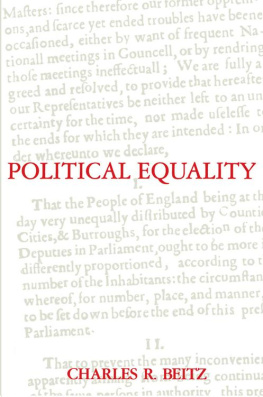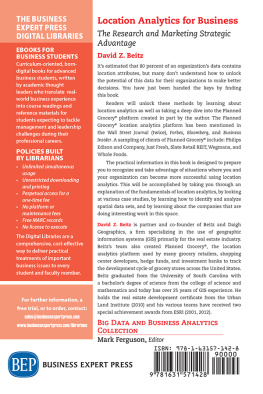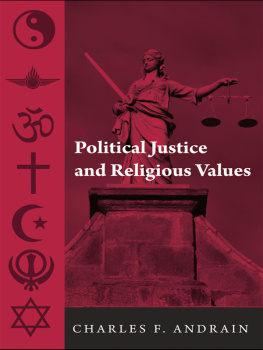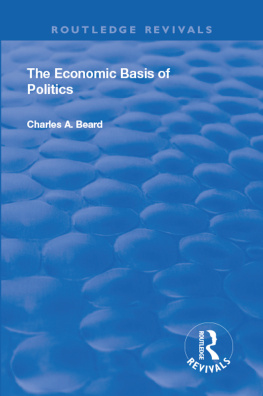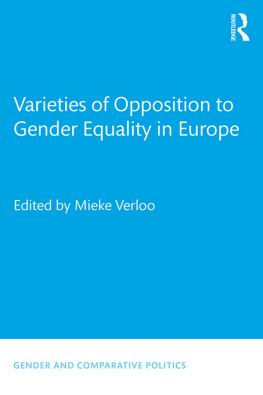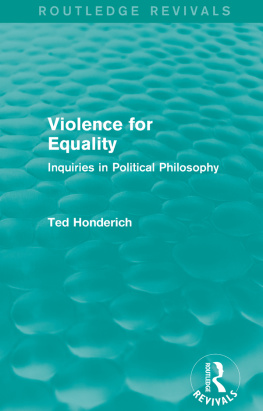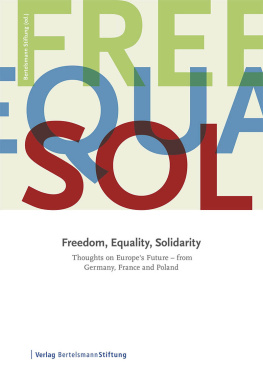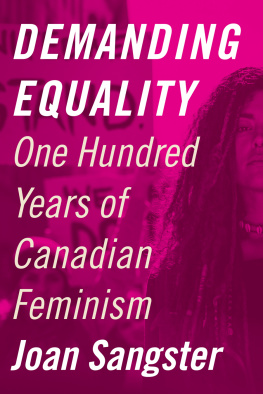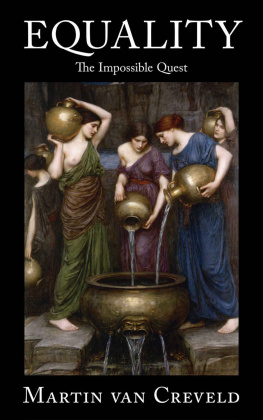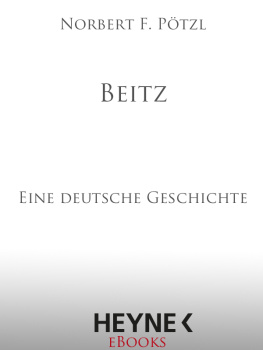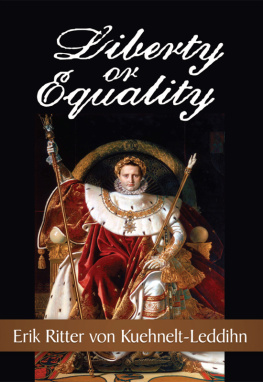Charles R. Beitz - Political Equality
Here you can read online Charles R. Beitz - Political Equality full text of the book (entire story) in english for free. Download pdf and epub, get meaning, cover and reviews about this ebook. year: 2020, publisher: Princeton University Press, genre: Politics. Description of the work, (preface) as well as reviews are available. Best literature library LitArk.com created for fans of good reading and offers a wide selection of genres:
Romance novel
Science fiction
Adventure
Detective
Science
History
Home and family
Prose
Art
Politics
Computer
Non-fiction
Religion
Business
Children
Humor
Choose a favorite category and find really read worthwhile books. Enjoy immersion in the world of imagination, feel the emotions of the characters or learn something new for yourself, make an fascinating discovery.
- Book:Political Equality
- Author:
- Publisher:Princeton University Press
- Genre:
- Year:2020
- Rating:5 / 5
- Favourites:Add to favourites
- Your mark:
- 100
- 1
- 2
- 3
- 4
- 5
Political Equality: summary, description and annotation
We offer to read an annotation, description, summary or preface (depends on what the author of the book "Political Equality" wrote himself). If you haven't found the necessary information about the book — write in the comments, we will try to find it.
Political Equality — read online for free the complete book (whole text) full work
Below is the text of the book, divided by pages. System saving the place of the last page read, allows you to conveniently read the book "Political Equality" online for free, without having to search again every time where you left off. Put a bookmark, and you can go to the page where you finished reading at any time.
Font size:
Interval:
Bookmark:
CHARLES R. BEITZ
An Essay in Democratic Theory
PRINCETON UNIVERSITY PRESS
PRINCETON, NEW JERSEY
Copyright 1989 by Princeton University Press
Published by Princeton University Press, 41 William Street,
Princeton, New Jersey 08540
In the United Kingdom: Princeton University Press, Oxford
All Rights Reserved
Library of Congress Cataloging-in-Publication Data
Beitz, Charles R.
Poltical equality: an essay in democratic theory / Charles R. Beitz.
p. cm. Bibliography: p. Includes index.
ISBN 0-691-07791-6 (alk. paper)
ISBN 0-691-02271-2, paperback
eISBN 978-0-691-22141-0
1. Equality. 2. Democracy. I. Title.
JC575.B45 1989 321.8dcl9 88-29276
R0
FOR
Jean H. Beitz
AND IN MEMORY OF
Richard C. Beitz
ix
xvii
Political theories can be democratic in two different, although related, senses. Democratic theories in the narrower (and more traditional) sense speak to the question, what is the best form of government? Those in the broader sense ask, instead, what is the best society?
In recent years, philosophers and political theorists have concentrated their attention on democratic theory in the broader sense, with particular emphasis on the subject of social justice. This departure from tradition has been enormously fruitful: philosophical thought about the basis and character of a democratic society has attained a richness and texture it has not known for decades.
So it is not a criticism of recent writing in democratic theory to observe that, with a few significant exceptions, it has given more narrowly political and institutional problems less than their due. Nevertheless, these problems need attention. Without a clear grasp of the foundations of democracy as a political form, we have no basis in political morality for resolving important issues concerning the structure and processes of the institutions of self-government. Moreover, there is a risk that the public character of democratic political life will be misunderstood.
For the subject of political equality, the need for closer theoretical attention is especially acute. In the last twenty-five years, a set of ostensibly egalitarian institutional reforms has taken place in the United States whose historic dimensions have perhaps not yet been fully appreciated.
All of these reforms were defended by their proponents as requirements of political equality. Yet, as continuing controversy in the courts, the legislatures, and the political parties attests, there is no consensus about the meaning of this principle. Even the most ardent supporter of the reforms is bound to be troubled by this questioning: while we feel confident that political equality means something, it is surprisingly difficult to give it a clear explanation and defense. The legislators and judges who designed and carried out the reforms are not much help, since they themselves were seldom articulate about their principles. Nor can much guidance be found in the recent work of political theorists. Owing to the concentration on issues of democratic theory in its larger sense, there is little in the way of coherent political doctrine to fall back on when, as now, procedural reforms come under political challenge; we are forced to rely on unexamined intuitions and a crude balancing of interests in assessing the merits of contending positions.
This book is a contribution to democratic theory in the narrower sense. It has two main aims. The first and more philosophical is to arrive at a systematic theory of political equality that will clarify the meaning of the egalitarian ideal in light of the reasons we have for accepting it. This would be an important task for democratic theorists even if the subject were not the focus of political controversy. For although nothing is to be gained by claiming that equality is part of the definition of democracy, any philosophical theory of democracy that failed to take up the grounds and content of political equality would be seriously deficient. To be sure, no account of political equality, no matter how comprehensive, can hope to encompass all of the reasons why democratic institutions might be valued or all of the desiderata that their procedures should satisfy. But no theory of democracy that failed to give the egalitarian idea a central place could possibly yield a faithful representation of the extraordinary grip of democracy on the modern political imagination.
Contemporary controversy about how political equality bears on institutional reform points toward a second and more practical aim. Just as an adequate democratic theory should give a central place to the ideal of equality, so too it should be framed in a way that illuminates matters about which people actually argue, revealing the extent to which disagreement turns on philosophical dispute about first principles and that to which it involves conflict about historical or casuistical questions instead. Although it would be naive to expect a philosophical theory, by itself, to resolve controverted questions of institutional design, an adequate theory should at least identify the central values at issue and provide a structure that informs their application. Accordingly, I shall try to show how dispute about the meaning and grounds of political equality is reflected in contemporary disagreement about how the institutions of democratic politics should be arranged and to illustrate how the theory of political equality that I shall set forth would influence our judgments about these questions.
Political equality refers to a set of requirements that apply to the institutions that enable citizens to participate in political decision making in a constitutional democracy. The basic idea of this book is that these requirements are best understood in the perspective of a substantive ideal of democratic citizenship that explains how we should construe them and why they should matter to us.
The presentation is divided into two parts, the first concerned primarily with theoretical considerations and the second with their application to institutions. I begin in with the question of the subject of political equality, or what a theory of political equality can be about. According to what I shall call the simple view, the main problem is merely to say in what respects the terms of participation in democratic institutions should apply equally to all citizensthat is, how equality of political right should be conceived. In contrast, I shall argue that considerations of equality operate at a greater remove from institutional judgments, which are more accurately seen as judgments about fair participation than about equal participation. Fair institutions should treat people as equals, but whether this implies that any particular political rights should be distributed equally to all citizens is part of the problem a theory should resolve rather than a premise to be taken for granted.
Once the subject of political equality is understood in this way, it is possible to identify several prominent theories. The leading alternatives I shall consider are best result, popular will, and procedural theories. The examination of these alternatives in , takes up what is perhaps the most striking example of inegalitarianism in modern democratic theorythe defense of plural voting set forth by John Stuart Mill. I try to show that an accurate understanding of Mills error casts doubt as well on any theory of political equality that holds that the conditions of fair participation derive from a conception of the overall results that the political system should promote.
Font size:
Interval:
Bookmark:
Similar books «Political Equality»
Look at similar books to Political Equality. We have selected literature similar in name and meaning in the hope of providing readers with more options to find new, interesting, not yet read works.
Discussion, reviews of the book Political Equality and just readers' own opinions. Leave your comments, write what you think about the work, its meaning or the main characters. Specify what exactly you liked and what you didn't like, and why you think so.

